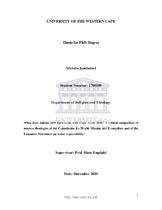| dc.contributor.advisor | Engdahl, Hans | |
| dc.contributor.author | Jambulosi, Mavuto | |
| dc.date.accessioned | 2021-04-08T13:49:15Z | |
| dc.date.available | 2021-04-08T13:49:15Z | |
| dc.date.issued | 2020 | |
| dc.identifier.uri | http://hdl.handle.net/11394/8165 | |
| dc.description | Philosophiae Doctor - PhD | en_US |
| dc.description.abstract | This research compares the similarities and differences in the official documents and proceedings of the Commission for World Mission and Evangelism (CWME) in Athens 2005 and the Lausanne Movement held in Cape Town in 2010. The former has always exhibited a missiology strong in issues of social justice while the latter has for a long time been consistent in identifying mission as evangelism. The close of the 19th century and the early part of the 20th saw the emergence of the social gospel, which came about as a result of the historical critical approach to biblical texts. Fundamentalists, arose as a reactionary phenomenon to the social gospel, while emphasizing fundamentals of the Christian doctrines and a strict premillennial eschatology which resisted social involvement in favour of salvation of souls. | en_US |
| dc.language.iso | en | en_US |
| dc.publisher | University of Western Cape | en_US |
| dc.subject | Evangelism | en_US |
| dc.subject | Gospel | en_US |
| dc.subject | Theology | en_US |
| dc.subject | Transformation | en_US |
| dc.subject | Ecumenical | en_US |
| dc.subject | Evangelical | en_US |
| dc.title | What does Athens 2005 have to do with cape town 2010? A critical comparison of mission theologies of the commission for world mission and evangelism and of the Lausanne movement on social responsibility. | en_US |
| dc.rights.holder | University of Western Cape | en_US |

